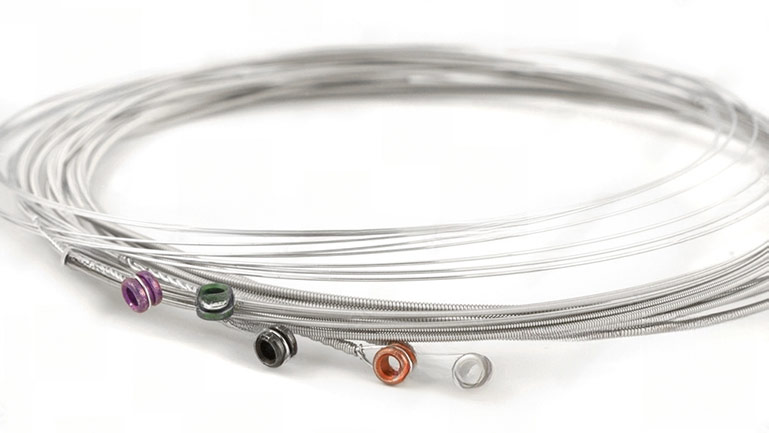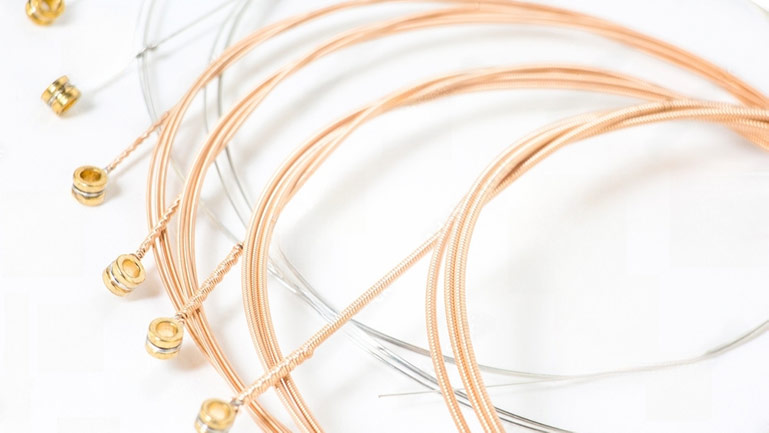Guitar strings are not human consumable, but people who have strung their guitars with strings they kept for years have had differing experiences. Some were surprised to find out the strings were as good as new, while others found the strings had rust marks spread all over them. This makes us wonder – do guitar strings go bad in their package?
Guitar strings can last a long time in their original packaging if kept in a relatively mild (no coastal areas) environment, away from excessive humidity and out of sunlight. The shelf life could be anywhere between 3-10 years and will depend on many factors such as if the packaging is air-tight or not, the material of the strings, any coatings they have etc. Other factors that affect the “shelf life” would be environmental factors such as humidity, temperature and salty air which could be the biggest factor of corrosion.
How Long Can You Keep Unopened Guitar Strings?
Check out this post if you need help with your guitar strings sounding dead or bad.
Guitar strings being made of metal can degrade over time if they come in contact with moisture and air. However, most strings come in air-tight sealed packages and are, therefore, less prone to oxidation and degradation over time. String packages that mention air-tight packaging (D’Addario likes to use a fancy name, Corrosion Intercept Technology) can be expected to stay fresh in the package even after 3-10 years, depending on how they are kept.
A cool and dry place is something you expect to keep your pills, but guitar strings can easily go bad if not kept away from a constantly humid place. Sunlight can also degrade the packaging over time, making them less effective in maintaining the air-tight seal.
The older Ernie Ball strings that came in paper packets may last less long in their package. However, newer Ernie Ball strings come in plastic packaging, and some have air-tight packaging (which Ernie Ball calls Element Shield Packaging). These should again last between 3-10 years in their unopened package.
Most electric and acoustic guitar strings are made of stainless steel, which is resilient to moisture and rust. However, after a long enough time, even stainless steel does corrode. Strings with nickel or other platings may last longer especially nickel-plated stainless steel. Still, keeping the strings in their original packaging is highly recommended because almost all metals and alloys corrode from humidity and temperature over the course of years.
Can Coated Strings Last Longer in Package?

Coated strings, though less popular due to the slightly different tones they produce, can impact the strings’ lifespan both in use and in the package. Traditional coatings include a phosphor-bronze coating that keeps most of the original tone of the strings intact but offers better oxidation prevention and keeps the strings fresh for longer. Newer polymer coatings, like Elixir’s Nanoweb coating, can keep strings sounding bright when strung and preserve them from corrosion when kept in the packaging for a long time.
Some people have reported forgetting coated strings (the older phosphor-bronze ones) for tens of years only to string the guitar with them and, to their surprise, find that they still sounded completely new. Of course, packaging also matters; an air-tight outer package with separate inner packaging for each string will have a higher chance of lasting far longer in the package. Because even the most resilient metals or coatings can degrade when exposed to humidity and harsh environment.
To restate, coated strings will last longer both in the package and when put on a guitar. They also keep their fresh, bright tone longer than most uncoated strings.
What Affects the Shelf Life of Strings?
Want to cut your guitar strings but don’t have clippers? Check out our detailed guide.
It is common knowledge among people living in coastal areas that the salty atmosphere is the biggest foe of anything metal. Same with metal strings. The biggest contributor to corrosion over time would be humidity and salty air, prevalent in areas near the sea.
Another critical factor is sunlight which can damage the plastic packaging over time, making them lose thier effectiveness. This can make the packaging no longer air-tight and unable to protect the strings against air and humidity. Direct contact with humidity can corrode the strings quite fast (in a matter of a few months to a year).
Ways to Store Unused Guitar Strings
It would be best to store your guitar strings in a cool, dry and dark place away from sunlight. Sunlight can degrade the plastic packaging, making the outer cover meaningless and unable to protect the strings from exposure to the air and humidity. Cool doesn’t mean keeping the strings in a refrigerator, though. Any place at room temperature is okay, which could mean not keeping them in a basement or without heating or air conditioning. The final factor, which is moisture or the lack of it, is the most important. Moisture will corrode most metals, even those that are very resilient.
Keep In in Its Original Package
It is very important that you only open the original packaging of the strings if you’re trying to put them on a guitar. It is especially critical for air-tight packaging. These packets are specifically meant to protect the strings from exposure to the atmosphere and, in most cases, will be able to prevent the strings from going bad for years and even decades (not that I recommend that).
If you have accidentally opened the original packaging your best bet would be to seal them in an air-tight plastic bag and use them sooner than any other string you have.
Put the Packet in an Air-Tight Plastic Bag
If you’re unsure about the effectiveness of the original packaging against protection from corrosion or its airtightness, you can put it inside an air-tight plastic bag and seal it. This would ensure that the strings are, in fact, in air-tight packaging, which will prevent them from oxidation and corrosion.
If you have bought or like to buy strings in bulk (as this might be cheaper), it is always a good idea to seal them in air-tight packaging. You can either put all your strings in a large air-tight plastic bag or divide them across several plastic bags. This is a great way to keep a lot of strings handy without the fear of them going bad in packaging.
What Packaging Standards Do String Manufacturers Follow?
There is no packaging standard when it comes to guitar strings (at least not one that I could find). Ernie Ball and a few others have used paper packaging in the past, and most guitar string manufacturers nowadays use plastic outer packaging with each string in a separate packet inside.
While not completely air-tight, such packaging should still keep the strings from rusting and corroding for a few months to several years, depending on how and where the strings are kept.
Some guitar packets mention protective packaging, while others do not, and it is safe to assume the packaging is not air-tight unless specifically mentioned. As we have learned, moisture and exposure to air are one of the main culprits when it comes to damaging guitar strings. The string manufacturers, like us, also know of this fact. Still, many strings do not come in air-tight packaging, which is an even bigger issue for people living in harsher environments for metals like coastal areas.
If you live in environments that are not very kind to things made of metal, please use your own air-tight packaging rather than relying on string manufacturers’ packaging, which might be less than optimal.
Other Related Questions
Do Guitar Strings Have a Best Before Date?
No, guitar strings do not have a "best before date". However, strings packaged in non-airtight packets can go bad. Depending on the string type and coating, it can range from just visible oxidation to major rusting. High humidity and salty air can aggravate the corrosion several folds, while coatings such as polymer and phosphor-bronze plating can negate it.
How Long Do Ernie Ball Strings Last in Packet?
Older Ernie Ball strings that came in paper packaging did go bad within a couple of years, where strings would have visible rust spots. Newer strings (even those not mentioning air-tight packaging) come in a plastic packet, with each string inside a separate paper envelope.
If you buy a set (such as a set of 3, 6, or 12), they usually come in a larger plastic bag with each set in its own separate plastic packet and then each string in its own paper envelope. Many people buy strings in bulk because it's cheaper, and if kept properly, you should expect fresh and corrosion-free strings for your guitar for several years (1-3).
Some slightly expensive Ernie Ball Strings come in Element Shield Packaging, which should keep the strings from corroding even in harsher coastal areas.


